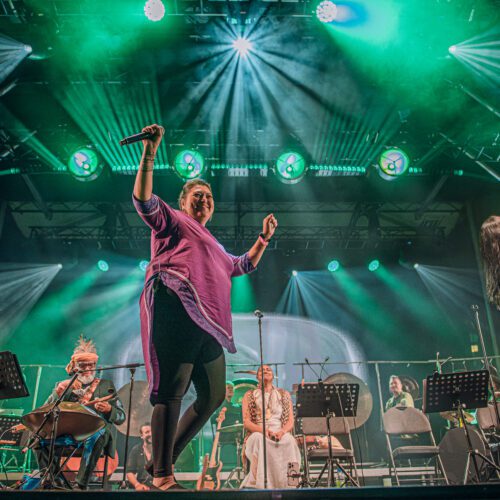At the end of the second chapter of a career barely begun, psychological distress led Klô Pelgag to difficult introspection into this existence of hers, and which will be hers for a long time to come. Let’s assume so, for she has the necessary talent and the power to deconstruct her art without denying it, to rebuild it, to make it live a lifetime and more. Pelgag knows perfectly well that it’s never a given for anyone: it takes courage to stand up after the slap-downs and all the great uncertainties, to let go, to knock off the navel-gazing, to move forward, to make one’s pain a fuel for creation. Notre-Dame-des-Sept-Douleurs embodies an important transformation in the third chapter: Klô Pelgag becomes the composer, lyricist, arranger, co-producer of her work, moreover orchestra leader, the only mistress on board. She even allows herself ambitious arrangements for chamber pop, a complex task once entrusted to her brother Mathieu, educated and trained in this capacity. Listening carefully to her three albums leads to this observation: harmonically, her arrangements for strings have perhaps not yet acquired the depth, breadth and contemporaneity of those of her first two albums, with a few exceptions – the finale of “La maison jaune”, for example. A superficial listen, rather, leaves the impression of a continuity, which is not exactly the case, but this work presents the seeds of a distinct orchestral discourse, and we exclude here the three more mature arrangements care of Owen Pallett, Polaris prize-winner (under the pseudonym of Final Fantasy) and close collaborator of Arcade Fire. The organization of the sounds for a big band (strings, brass) is a conclusive learning process, the dynamics in a small band differs from what we’ve heard before from Klô Pelgag, here one feels a new force unfolding, an occasionally rock spirit. But what’s most remarkable about this album is in the lyrics and the voice that carries them. The words are organised more simply, the poetic explosions are better highlighted, the author spares no effort and trims for the better. This is certainly an album whose appreciation grows with time.
Latest 360 Content
Album review Classical/classique 2025
Quatuor Bozzini – Owen Underhill : Songs and Quartets
By Frédéric Cardin
Album review Classical/classique 2025
English National Opera Orchestra/Martyn Brabbins – Havergal Brian : Agamemnon; Sinfonia tragica; Symphony no 12
By Frédéric Cardin
Album review Classical/classique 2025
The Curious Bards – Sublimation: Songs and dances from 18th-century Scandinavia
By Frédéric Cardin
Album review Classical/classique 2025
Ensemble Masques/Olivier Fortin – Bach, Telemann & Albinoni: Concerti
By Frédéric Cardin
Album review Experimental / Contemporary/expérimental / contemporain/Hip Hop/Jazz 2025
Quinton Barnes – Black Noise
By Frédéric Cardin
Album review Classical/classique 2025
François Leleux/Lisa Batiashvili/Frankfurt Radio Symphony – Future Horizons
By Frédéric Cardin
Album review Jazz 2025
Nate Mercereau · Josh Johnson · Carlos Niño – Openness Trio
By Frédéric Cardin
Album review Classical/classique 2025
Kent Nagano/Rebekka Hartmann – Hartmann/Ravel/Sadikova
By Frédéric Cardin
Album review Classical/classique 2025
Frédéric Lambert; Chloé Dumoulin – Nouveau lyrisme
By Frédéric Cardin
Concert review Folk/Americana/latino
Sara Curruchich in concert : great songstress of mayan roots and feminist intensity
By Frédéric Cardin
Album review Classical/classique 2025
London Philharmonic Orchestra – Tania Leon : Horizons; Raices (Origins); Stride; Paisajes
By Frédéric Cardin
Album review Classical/classique/Électronique 2025
Andrew Staniland – The Laws of Nature
By Frédéric Cardin
Album review Classical/classique 2025
Cyrille Dubois, etc. – Geroges Bizet: Les Mélodies
By Frédéric Cardin
Concert review Indigenous peoples/Pacific / Oceania/Classical/classique























